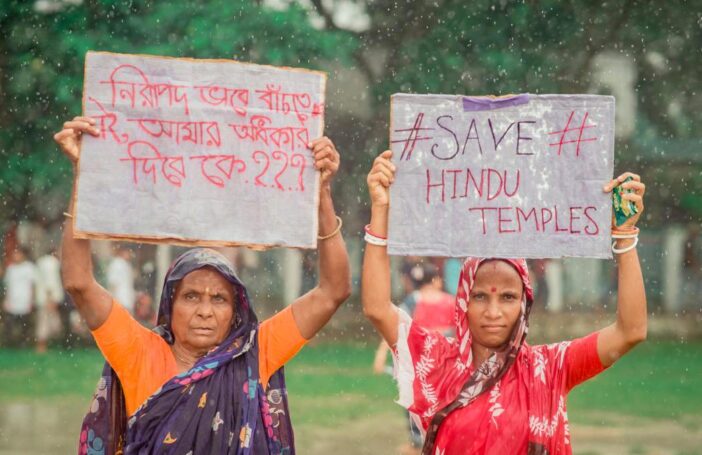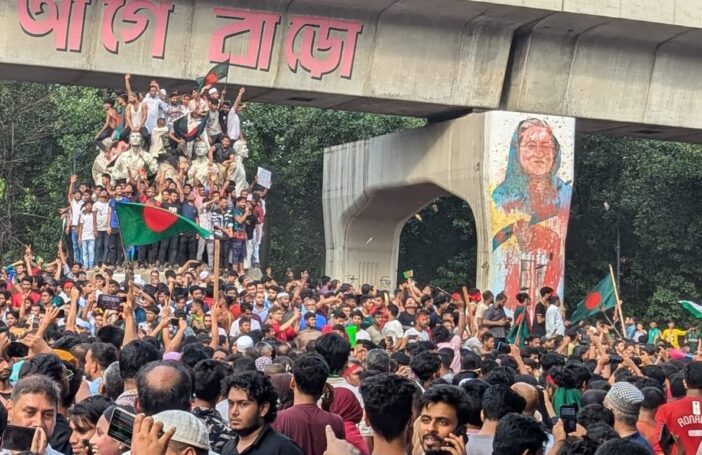The monsoon rains have long been a harbinger of fertility and prosperity in Bangladesh, washing away salinity and bringing shakti, or wellness, to the land. It is perhaps fitting that the mass protests which eventually toppled the Hasina government in August 2024 have been poetically referred to as “the monsoon revolution”. While much has been written about the geopolitical implications of this reversal, this article will assess the implications of the unexpected fall of the Awami League government for the development sector in Bangladesh.
The protests led by the Anti-discrimination Student Movement in Bangladesh were not expected to overthrow the government. From the outside, the protestors seemed focused on a single issue: biases in the civil service which restricted 30% of coveted government jobs to descendants of freedom fighters, 50 years on from the country’s Awami League-led independence war. However, faced with violent repression and accused of treason, students aired their grievances about 15 years of authoritarian rule which saw the decline of political rights and an increase in inequality.
In rejecting former Prime Minister Sheikh Hasina, the students have also rejected her brand of authoritarian neoliberalism which led to the country’s economic situation, calling for the arrest of hundreds of politicians and the creation of a new constitution. However, the student movement has not gone so far as to challenge the state’s rentier relationship with NGOs and international capital. Widely seen as a unifying figure in the nation, 2006 Nobel Peace Prize laureate Muhammad Yunus was selected as a figurehead for the new administration. Since taking up the position, he has sought to reassure the international community that Bangladesh is open to development assistance and diplomatic visits.
That the students took aim at the regime, but not the broader development ecosystem which has contributed heavily to social conditions in the country, presents an interesting development with respect to the idea of the “franchise state”. This theory, introduced by Geof Wood in his 1994 article “States without Citizens“, posits that NGO assumption of service delivery distances the government from accountability to the population. This leads to a rentier system, with citizens able to look past corruption and authoritarianism so long as the government delivers according to a social contract.
The theory helps bring the wealth of literature on aid-dependence and rentier states into the Bangladeshi context, where NGOs, with external support, have taken an almost governmental role in the delivery of basic services. In Bangladesh, this dependence on external funding was a major enabler of the country’s governance breakdown. The state could afford to be corrupt and inefficient, as long as NGOs continued to ensure social program delivery. However, when the rentier agreement could no longer be maintained the people turned on the government.
Hasina’s boasts of economic growth and progress notwithstanding, costs of living had grown, while the rhetoric of Bangladesh as an emerging economy had inflated expectations beyond what NGOs’ social programs could provide. Bangladesh needed functional governance and a truly open market. Throughout my visit there in June 2024 to undertake fieldwork, less than a month before the protests kicked off, the tension was palpable. Almost everybody blamed the government for the situation, even those who spoke very critically of development programs.
Despite the complicity of many international projects in the flaws of Bangladeshi governance, the development sector has emerged as a major winner from the monsoon revolution. While the status of big-ticket projects such as the Bangladesh Delta Plan 2100 — which aims to prevent major flooding and has been closely associated with the Hasina regime — may be reviewed in the future, the current focus on good governance and the promised removal of Awami League appointees from the civil service by the new government stand to increase the role played by development capital.
Bangladesh therefore finds itself in a highly volatile position. The Awami League’s regime presided over a degeneration of Bangladeshi state capacity, increasing corruption and authoritarianism. Eventually, it was not able to maintain the economic progress which had kept the regime alive. However, the Bangladesh National Party (BNP), who were the major opposition party and are widely expected to take control in the upcoming elections, were responsible for much of the same when they were in power. Should they take power, without challenging the basis of the franchise state in Bangladesh, they are likely to repeat the decisions of their predecessors.
However, the student protests attracted thousands of demonstrators without links to existing political parties, something rarely seen in previous political contestations. Within this youth demographic lies the potential to reject business-as-usual politics and address issues at their roots. To do so will be extremely difficult. Challenging the franchise state itself would require a rejection of institutions associated with Bangladesh’s independence and indeed the country’s self-image. The aid landscape in Bangladesh has been normalised to the point of being taken for granted. International financiers barely question their right to impose mega-projects.
Bangladesh stands at a crossroads. The fall of the Awami League reinforces the fragility of a state built on the rentier dynamics of the franchise state, where misgovernance is obscured by NGOs which ensure essential services are delivered. While the student protests indicate an appetite for change, the governance structures of the franchise state remain in place. If these protests are to translate to genuine transformation, it will require not just political reform but a rethinking of Bangladesh’s relationship with external development capital.
The Anti-discrimination Student Movement offers an opportunity to redefine governance by emphasising accountability and inclusivity. For the development sector, this is a chance to support, not supplant, state capacity. Without such efforts, Bangladesh risks repeating the last 30 years, oscillating between corrupt regimes which ignore the root causes of its governance crisis.





Nothing about the performance (or otherwise) of the Grameen Bank, as a service deliverer. Especially since its founder Mohammad Yunus, was forced out in 2011: “Bangladesh’s central bank has removed the Nobel peace prize winner Muhammad Yunus from the post of managing director of the microfinance pioneer Grameen Bank, after allegations of “irregularities” in its operations………………………………….
The Bangladeshi government has a 25% stake in the Grameen, which lends to more than 8 million families in Bangladesh and is hugely popular.”
https://www.theguardian.com/world/2011/mar/02/muhammad-yunus-grameen-bank
According to Grameen itself: “three directors, including the Chairman of the Board are appointed by the Government,” https://grameenbank.org.bd/governance/board-of-directors
It would be very useful to analyse Grameen’s performance since 2011 – relating to its key role in microfinance for the rural poor.
2005 was the International Year of Microcredit. As was asserted: “The year of Microcredit 2005 calls for building inclusive financial sectors and strengthening the powerful, but often untapped, entrepreneurial spirit existing in communities around the world.” How did that work for Bangladesh ?